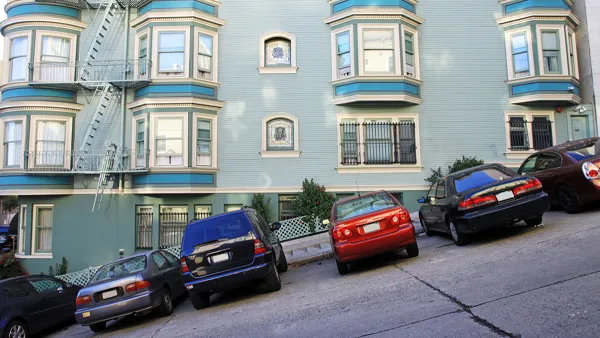The search for an available parking space in most busy downtowns can be frustrating, especially when the motorist insists on parking for free. For those cities that do charge for parking, can a variable price free-up spaces? SF hopes to prove so.
Two NYT reporters, Michael Cooper and Jo Craven McGinty provide a timely update on SF Park - a federally subsidized program that utilizes embedded sensors in on-street parking spaces to detect when a vacancy occurs and varies meter prices based on time of day and location. One main objective of the plan is to utilize pricing (often referred to as dynamic or performance pricing) and technology to reduce traffic congestion caused by motorists searching for available on-street parking.
"The program here is being closely watched by cities around the country. With the help of a federal grant, San Francisco installed parking sensors and new meters at roughly a quarter of its 26,800 metered spots to track when and where cars are parked. It is too early to tell whether the program is working over all, but an analysis of city parking data by The New York Times found signs that the new rates are having the desired effect in some areas."
However, the reporters also found that "about a fifth of the time" parking availability did not always correspond with prices, i.e. sometimes parking availability would increase with decreased prices and would decrease when prices were lowered.
"The program is the biggest test yet of the theories of Donald Shoup, a professor of urban planning at the University of California, Los Angeles. "I think the basic idea is that we will see a lot of benefits if we get the price of curbside parking right, which is the lowest price a city can charge and still have one or two vacant spaces available on every block," he said.
Thanks to Mayer Horn
FULL STORY: A Meter So Expensive, It Creates Parking Spots

Analysis: Cybertruck Fatality Rate Far Exceeds That of Ford Pinto
The Tesla Cybertruck was recalled seven times last year.

National Parks Layoffs Will Cause Communities to Lose Billions
Thousands of essential park workers were laid off this week, just before the busy spring break season.

Retro-silient?: America’s First “Eco-burb,” The Woodlands Turns 50
A master-planned community north of Houston offers lessons on green infrastructure and resilient design, but falls short of its founder’s lofty affordability and walkability goals.

Test News Post 1
This is a summary

Analysis: Cybertruck Fatality Rate Far Exceeds That of Ford Pinto
The Tesla Cybertruck was recalled seven times last year.

Test News Headline 46
Test for the image on the front page.
Urban Design for Planners 1: Software Tools
This six-course series explores essential urban design concepts using open source software and equips planners with the tools they need to participate fully in the urban design process.
Planning for Universal Design
Learn the tools for implementing Universal Design in planning regulations.
EMC Planning Group, Inc.
Planetizen
Planetizen
Mpact (formerly Rail~Volution)
Great Falls Development Authority, Inc.
HUDs Office of Policy Development and Research
NYU Wagner Graduate School of Public Service


























